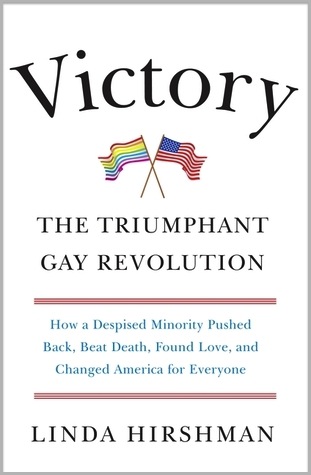 Reviewed: Victory: The Triumphant Gay Revolution, by Linda Hirshman (Harper, 464 pp., $27.99). Wear at least three “gender-appropriate” garments to the bar or risk a police bust. Get booted from the Army for loving a consenting adult.
Reviewed: Victory: The Triumphant Gay Revolution, by Linda Hirshman (Harper, 464 pp., $27.99). Wear at least three “gender-appropriate” garments to the bar or risk a police bust. Get booted from the Army for loving a consenting adult.
Marry your beloved and keep paying the IRS as though you were single. The spectrum of humiliations and civil rights violations faced by LGBTQ people has no neat cutoff; many are still the norm. Yet recent triumphs, like the repeal of “Don’t Ask, Don’t Tell” and landmark speeches by Hillary Rodham Clinton and Barack Obama, make this year as good a time as any to look back on what’s been achieved so far. In the readable and deeply researched Victory: The Triumphant Gay Revolution, lawyer and public intellectual Linda Hirshman recounts more than a century of gay and lesbian history.
Crazy, sinful, criminal, disloyal: Historically, these beliefs about gay men and lesbians have dogged them throughout the struggle for equality. Hirshman calls these false associations “the four horsemen of the gay apocalypse.” The movement and the culture have to quash them one by one; each defeat is necessary, but none is sufficient.
Winning the legal right to sexual privacy still leaves LGBTQ people open to diehard associations with sinfulness, which can bar them from becoming clergy and from acknowledgment in school textbooks. No longer being suspected of passing state secrets—the government’s justification for hundreds of firings in the 1950s and ’60s—still doesn’t protect LGBTQ people from being sacked arbitrarily.
Moreover, contends Hirshman, gay people have always been forced along an alternate path to liberation than that of women and African-Americans, because their sexual orientation means they can’t say they’re just like everyone else. “If gays based their claim to proper treatment on sameness to nongays, they would have been conceding that their difference was a drawback or a failing,” she writes. Instead, “they had to contend that Gay is Good.” Those who tried to mimic straight people, she says, have always been less effective than those who demanded that America recognize and embrace gay difference.
In a survey that begins before Prohibition and ends with a legal wedding in 2011 New York, Hirshman traces the rise of organized gay activism and its battles with sometime enemies like the psychiatric establishment—and the Supreme Court, which, in Bowers v. Hardwick; in 1986, galvanized activists by upholding a Georgia sodomy law.
Hirshman conducted dozens of interviews with, for example, ’50s pioneers Phyllis Lyon and Frank Kameny. She examines the influence of Harvey Milk, Larry Kramer, Ginny Apuzzo, Judy Shepard, Troy Perry, and Tony Kushner, among others, as well as gay-rights opponents like Anita Bryant and decision-makers like Anthony Fauci of the National Institutes of Health.
The book contains worthy tours of social history, such as early activists’ Stalin-inspired ideas of gay nationhood, the origins of the underground Mattachine Society, and the gay community’s growing confidence as its members nursed one another through the early years of AIDS and joined forces through ACT-UP and other pioneering organizations.
Hirshman focuses on gay male and, to a lesser extent, lesbian experience; she’s thin on transgender history and omits gender minorities, bisexuals, and movements comprising LGBTQ people of color. Her breezy prose reflects her robust Huffington Post clip file; her locutions include “sleazy judges,” “blowing an acquaintance,” and, in reference to the post-DADT military, “stop screwing around getting ready.” Some editorial asides can be grating. She twice attaches the word “predictably” to women’s actions, and, for unclear reasons, refers to the feminist slogan “The personal is political” as “poisonous.” More often, though, her tone is learned, friendly, and fascinating.
Gay history isn’t dead. It’s not even past. With so much political energy and money now being spent by people opposed to progressivism, it’s an open question whether we will look back on this decade as a highwater mark for lesbian and gay civil rights. It behooves us all to educate ourselves on how, and how painfully recently, these gains took place.


0 Comments